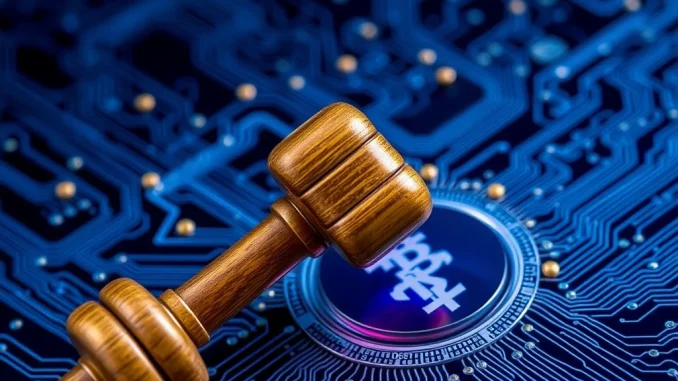
Get ready for some pivotal discussions in the crypto world! The U.S. Securities and Exchange Commission (SEC) is stepping up its engagement with the digital asset industry by scheduling four crucial crypto regulation roundtables throughout April, May, and June. This move signals a significant push towards establishing clearer guidelines for the burgeoning cryptocurrency market. For anyone involved in or observing the crypto space, these roundtables are a must-watch. Let’s dive into what we know so far and why these discussions matter.
Why are these SEC Crypto Regulation Roundtables Important?
The SEC’s Crypto Task Force is taking a proactive approach by initiating these roundtables. In a rapidly evolving landscape like cryptocurrency, regulatory clarity is paramount. These discussions are designed to bring together industry experts, stakeholders, and regulators to openly discuss the challenges and opportunities within the digital asset ecosystem. Think of it as a series of focused conversations aimed at shaping the future of SEC crypto regulation in the United States.
Here’s why these roundtables are grabbing headlines:
- Direct Dialogue: They provide a platform for direct interaction between the SEC and the crypto industry, fostering a collaborative approach to regulation.
- Focused Topics: Each roundtable is dedicated to a specific critical area within crypto, ensuring in-depth discussions and targeted outcomes.
- Proactive Stance: This initiative demonstrates the SEC’s commitment to understanding and adapting to the complexities of the digital asset market, rather than just reacting to events.
- Industry Input: The roundtables will likely incorporate insights and feedback from industry participants, which could significantly influence future regulatory frameworks.
What Key Topics Will the Crypto Roundtables Cover?
According to Eleanor Terrett’s update on X, the four roundtables will zero in on these essential areas:
| Roundtable Topic | Date |
|---|---|
| Crypto Trading | April 11 |
| Custody | April 25 |
| Tokenization | May 12 |
| DeFi’s Role in the U.S. Financial Landscape | June 6 |
Let’s break down why each of these topics is critical in the context of digital asset regulation:
Crypto Trading (April 11): Setting the Stage for Market Integrity
The first roundtable on April 11th will tackle crypto trading. This is a foundational aspect of the crypto market, and discussions here could significantly impact how exchanges and trading platforms operate. Key areas likely to be addressed include:
- Market Manipulation: Concerns around wash trading, pump-and-dump schemes, and insider trading in the crypto market are rampant. The SEC will likely explore ways to enhance market surveillance and enforcement.
- Investor Protection: Ensuring fair and transparent trading practices is paramount to protect retail investors from predatory activities. This could involve discussions on disclosure requirements and trading safeguards.
- Exchange Regulation: The regulatory framework for crypto exchanges is still evolving. The roundtable might delve into registration requirements, operational standards, and compliance obligations for these platforms.
Custody (April 25): Securing Digital Assets
Crypto custody, scheduled for April 25th, is another cornerstone of the digital asset ecosystem. Safeguarding digital assets from theft, loss, or misuse is crucial for building trust and fostering wider adoption. Expect discussions around:
- Custodial Solutions: Exploring different types of crypto custody solutions, including institutional-grade custodianship, self-custody, and the regulatory implications of each.
- Security Standards: Defining robust security standards for custodians to protect digital assets from cyber threats and internal risks.
- Regulatory Framework for Custodians: Establishing clear rules and guidelines for entities providing crypto custody services, potentially including capital requirements and operational oversight.
Tokenization (May 12): Unlocking New Possibilities, Navigating New Rules
Tokenization, slated for May 12th, is gaining traction as a way to represent real-world assets on the blockchain. This roundtable will likely explore the opportunities and challenges of tokenization, including:
- Security Tokens vs. Utility Tokens: Distinguishing between different types of tokens and applying appropriate regulatory frameworks. The Howey Test and its applicability to tokenized assets will likely be a key point.
- Regulatory Clarity for Tokenized Assets: Providing guidance on the legal and regulatory status of various tokenized assets, including real estate, commodities, and securities.
- Market Infrastructure for Tokenized Assets: Addressing the infrastructure needed to support the issuance, trading, and custody of tokenized assets, such as security token exchanges and compliant platforms.
DeFi’s Role in the U.S. Financial Landscape (June 6): Balancing Innovation and Oversight
The final roundtable on June 6th will tackle DeFi regulation and its role in the U.S. financial landscape. Decentralized Finance presents both immense potential and unique regulatory challenges. Key discussion points could include:
- Regulatory Perimeter for DeFi: Determining how existing securities laws and regulations apply to decentralized protocols and platforms. The decentralized nature of DeFi poses significant challenges to traditional regulatory models.
- Risk Management in DeFi: Addressing risks associated with DeFi, such as smart contract vulnerabilities, impermanent loss, and systemic risks. Exploring potential regulatory tools to mitigate these risks.
- Innovation vs. Regulation: Striking a balance between fostering innovation in the DeFi space and ensuring investor protection and market integrity. Finding ways to regulate DeFi without stifling its growth and potential.
What are the Potential Benefits and Challenges of Stricter Digital Asset Regulation?
Increased digital asset regulation, stemming from these roundtables and subsequent actions, could bring both benefits and challenges to the crypto industry.
Potential Benefits:
- Increased Investor Confidence: Clearer regulations can boost investor confidence by reducing uncertainty and creating a more secure and transparent market environment.
- Mainstream Adoption: Regulatory clarity can pave the way for greater institutional participation and mainstream adoption of cryptocurrencies.
- Reduced Risk of Illicit Activities: Stronger regulations can help combat money laundering, terrorist financing, and other illicit activities in the crypto space.
- Level Playing Field: Well-defined rules can create a level playing field for businesses operating in the crypto sector, fostering fair competition and innovation.
Potential Challenges:
- Stifling Innovation: Overly restrictive regulations could stifle innovation and push crypto activity to less regulated jurisdictions.
- Compliance Costs: Increased regulatory compliance can be costly and burdensome, particularly for smaller crypto businesses and startups.
- Complexity and Uncertainty: Developing effective and adaptable regulations for a rapidly evolving technology like blockchain is complex and presents ongoing challenges.
- Enforcement Difficulties: Enforcing regulations in a decentralized and global crypto market can be challenging for national regulators.
Actionable Insights: Staying Ahead of the Curve
For businesses and individuals in the crypto space, staying informed about these crypto roundtables and the evolving regulatory landscape is crucial. Here are some actionable insights:
- Monitor SEC Announcements: Keep a close watch on official SEC announcements and updates related to these roundtables and subsequent regulatory developments.
- Engage with Industry Associations: Participate in industry associations and forums to stay informed and contribute to the dialogue on crypto regulation.
- Seek Legal Counsel: Consult with legal experts to understand the potential implications of new regulations for your crypto activities and ensure compliance.
- Prepare for Regulatory Changes: Proactively adapt your business practices and operations to align with potential regulatory changes.
In Conclusion: A Pivotal Moment for Crypto Regulation
The U.S. SEC’s scheduling of these four crypto regulation roundtables marks a pivotal moment for the digital asset industry. These discussions have the potential to significantly shape the future regulatory landscape and impact the trajectory of cryptocurrency adoption in the United States and beyond. By focusing on key areas like trading, custody, tokenization, and DeFi, the SEC is signaling a serious commitment to understanding and regulating this transformative technology. The outcomes of these roundtables will be closely watched by the entire crypto community, and they represent a critical step towards establishing a more mature and regulated digital asset market. Stay tuned for further updates as these crucial conversations unfold!



